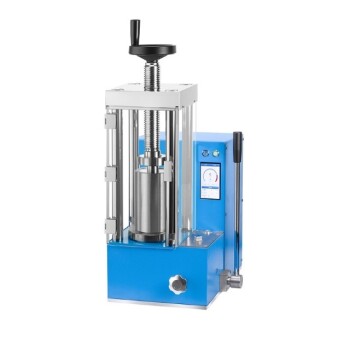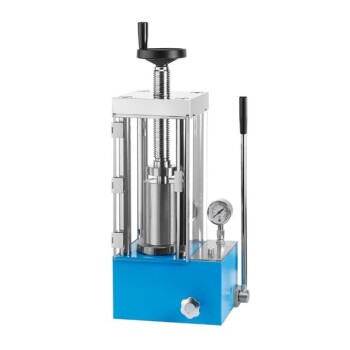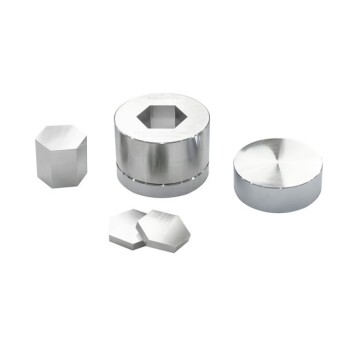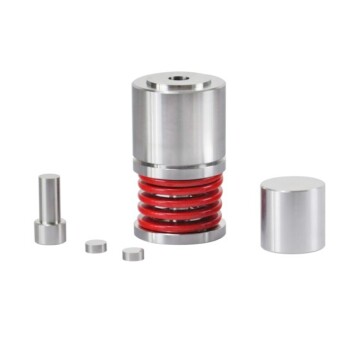In the military sector, Cold Isostatic Pressing (CIP) is a critical manufacturing process used to produce highly durable and lightweight components for applications where failure is not an option. It is the technology behind key parts in advanced armor, missile systems, and ruggedized communication hardware that must perform flawlessly under extreme environmental and mechanical stress.
The true value of CIP in a military context is not just the parts it creates, but the fundamental properties it imparts. The process engineers near-perfect material uniformity, eliminating the microscopic weak points that could lead to catastrophic failure in high-stakes operational environments.
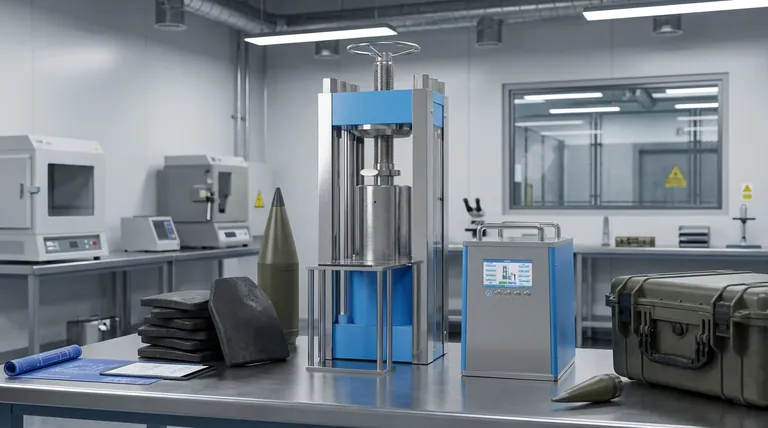
The Core Principle: Why Uniform Pressure Matters
CIP is a powder metallurgy process where a powdered material—be it ceramic, metal, or a composite—is consolidated into a solid shape before final heat treatment. The method's unique advantage lies in how it applies pressure.
How CIP Works
Instead of pressing a powder from one or two directions (uniaxial pressing), CIP submerges the powder-filled mold in a fluid. This fluid is then pressurized, compacting the powder with perfectly equal force from all directions simultaneously.
The "Green Body" Advantage
This process creates a pre-sintered part, known as a "green body," with exceptionally uniform density. There are no internal gradients, voids, or hidden stress lines that can form during one-directional pressing.
Predictable Performance, No Surprises
This uniformity is the key to reliability. A green body with consistent density will shrink predictably and evenly during the final sintering (heating) phase. The result is a finished component free of internal defects, ensuring its mechanical properties are consistent throughout the entire part.
Key Military Applications Driven by CIP
The unique properties achieved through CIP directly address the uncompromising demands of modern defense hardware.
Advanced Armor Systems
For armor, maximum stopping power at the minimum possible weight is the goal. CIP is used to form advanced ceramic plates (like silicon carbide or boron carbide) that are both incredibly hard and lightweight. The uniform density ensures there are no weak spots, providing consistent ballistic protection across the entire surface.
Missile and Aerospace Components
Components like missile nose cones (radomes), rocket nozzles, or turbine blades must withstand immense heat, pressure, and mechanical shock. CIP is used to form these complex shapes from high-performance ceramics or metal alloys, creating a near-perfect preform that can be sintered to achieve extreme thermal and structural integrity.
Ruggedized Communication Devices
Military electronics must operate through intense vibration, shock, and harsh weather. CIP is used to create durable ceramic or composite housings that protect sensitive internal components. The process allows for complex shapes that perfectly encase the electronics while providing superior environmental sealing and impact resistance.
Understanding the Trade-offs
While powerful, CIP is a specialized process chosen for specific reasons. It is not a universal solution.
Process vs. Performance
CIP is more complex and costly than simpler powder compaction methods. The decision to use it is a direct trade-off, prioritizing the absolute material integrity required for a critical application over lower manufacturing costs.
A Foundational Step, Not the Final One
A CIP-formed "green body" has very little strength on its own. Its final properties of hardness and durability are only realized after a subsequent high-temperature process, such as sintering or Hot Isostatic Pressing (HIP). The quality of the CIP stage, however, dictates the quality of the final part.
Geometry and Complexity
While capable of producing complex external shapes, highly intricate internal geometries can be challenging to create with CIP alone. It is often used to create a "near-net shape"—a part that is very close to its final form but may require some final machining for precision features.
Applying CIP to Your Goal
The decision to specify CIP is driven entirely by the operational requirements of the component.
- If your primary focus is ballistic protection: CIP is the optimal choice for creating large, defect-free ceramic armor plates with consistent, reliable stopping power.
- If your primary focus is high-stress components: Use CIP to form a uniform green body for parts that will experience extreme temperatures and forces, ensuring no hidden flaws compromise structural integrity.
- If your primary focus is environmental hardening: CIP delivers durable, near-net-shape housings that provide robust protection for sensitive electronics against shock, vibration, and the elements.
Ultimately, Cold Isostatic Pressing is a foundational technology that enables the production of next-generation materials essential for maintaining a decisive technological edge in the defense sector.
Summary Table:
| Application | Key Benefits |
|---|---|
| Advanced Armor Systems | Uniform density for consistent ballistic protection |
| Missile and Aerospace Components | High thermal and structural integrity |
| Ruggedized Communication Devices | Superior impact resistance and environmental sealing |
Upgrade your laboratory's capabilities with KINTEK's precision lab press machines! Whether you're developing advanced armor, missile components, or ruggedized electronics, our automatic lab presses, isostatic presses, and heated lab presses ensure uniform material density and reliable performance. Contact us today to discuss how our solutions can meet your specific military and laboratory needs—Get in touch now!
Visual Guide
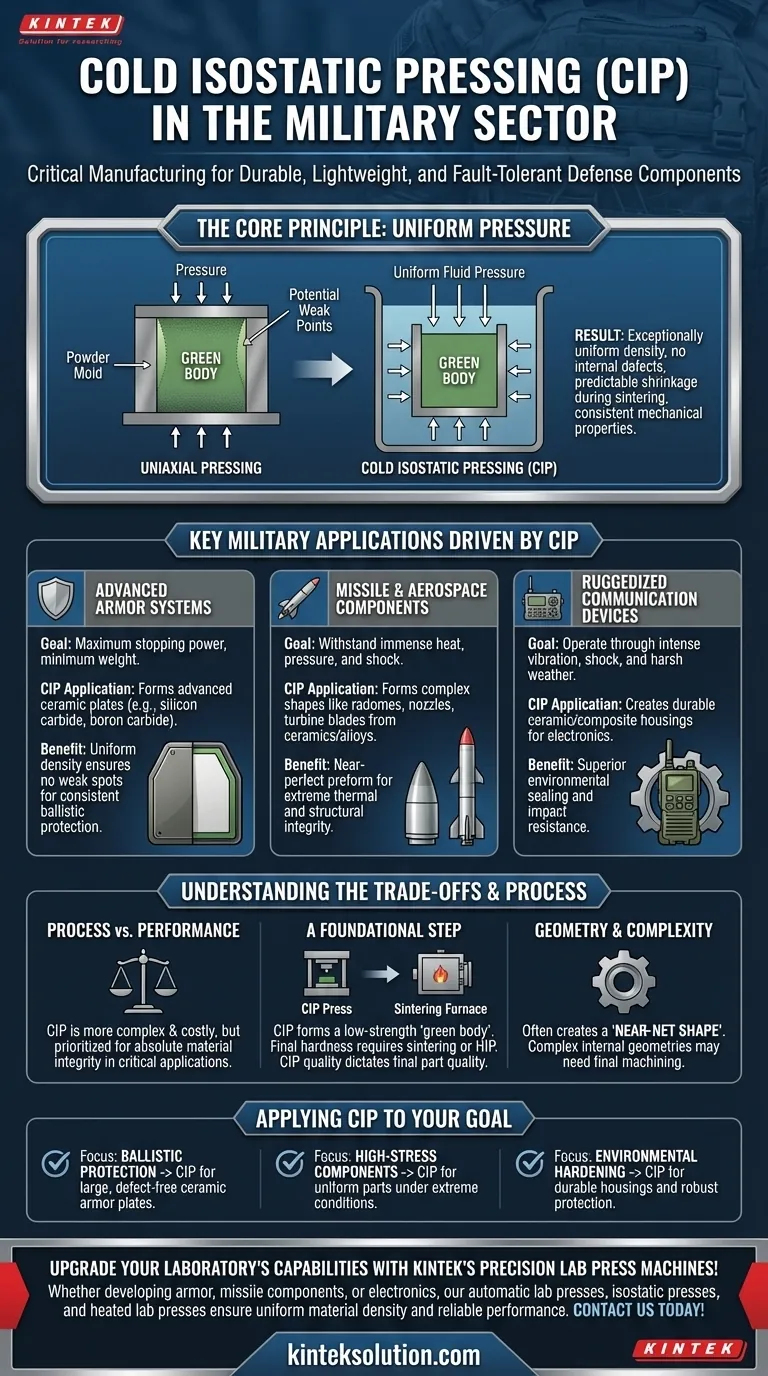
Related Products
- Electric Split Lab Cold Isostatic Pressing CIP Machine
- Electric Lab Cold Isostatic Press CIP Machine
- Automatic Lab Cold Isostatic Pressing CIP Machine
- Manual Cold Isostatic Pressing CIP Machine Pellet Press
- Automatic Laboratory Hydraulic Press Lab Pellet Press Machine
People Also Ask
- How does electrical Cold Isostatic Pressing (CIP) contribute to cost savings? Unlock Efficiency and Reduce Expenses
- What are some specific aerospace applications of isostatic pressing? Enhance Performance and Reliability in Extreme Conditions
- How does Cold Isostatic Pressing (CIP) compare to Powder Injection Molding (PIM) in terms of shape complexity? Choose the Best Process for Your Parts
- How does CIP improve the mechanical properties of refractory metals? Boost Strength and Durability for High-Temp Applications
- What is Cold Isostatic Pressing (CIP) used for? Achieve Uniform Density in Complex Parts

